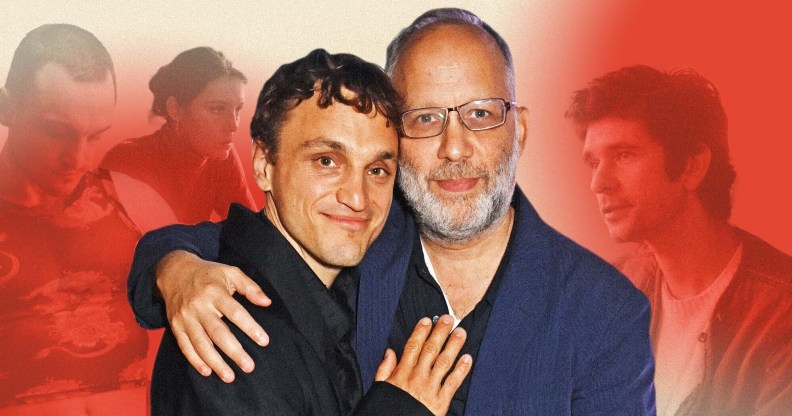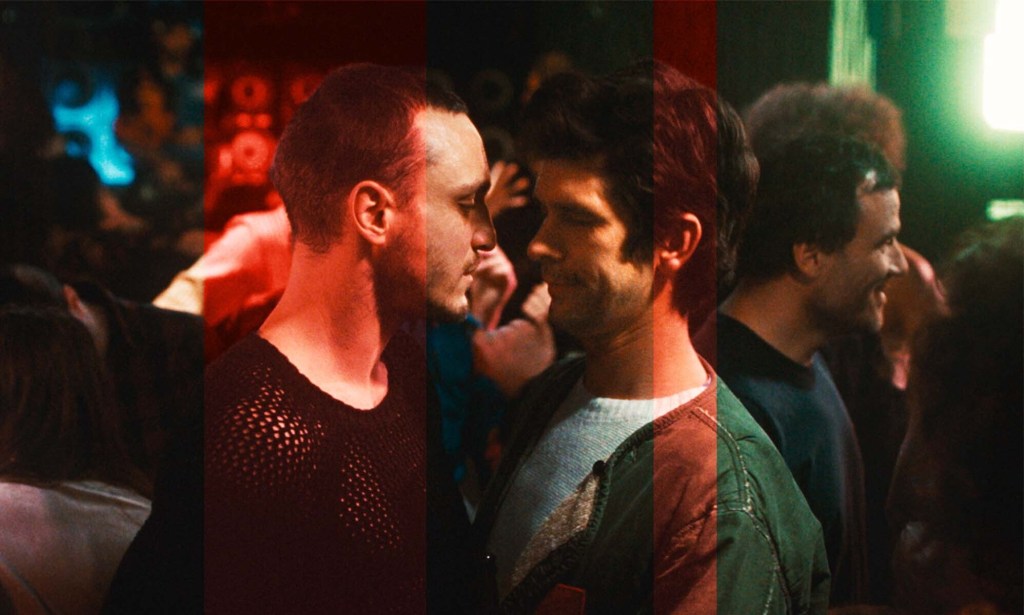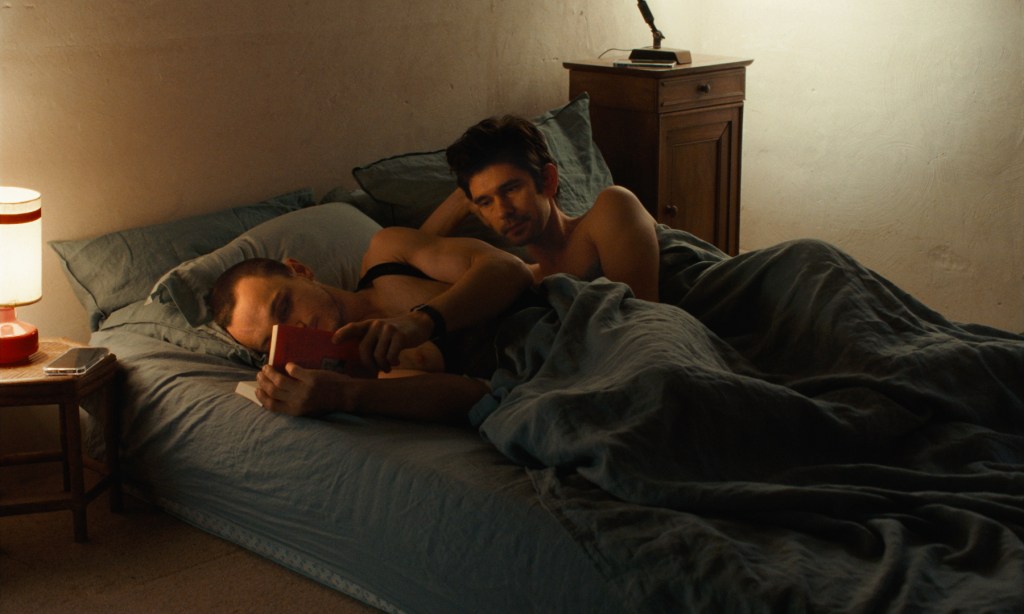Ira Sachs and Franz Rogowski on Passages: ‘Queerness is much bigger than sexual preferences’

Passages star Franz Rogowski and director Ira Sachs (Getty/MUBI)
Director Ira Sachs and star Franz Rogowski have spoken exclusively to PinkNews about their intimate, explicit new film, Passages.
It’s been some time since the pair have seen each other. “Our marriage didn’t last very long,” Rogowski says, gazing at Sachs, who responds, “Now we’re back together.”
Sachs and Rogowski are in London to promote their new film Passages, which opens in UK cinemas on Friday (1 September).
The story, which Sachs penned with frequent co-writer Mauricio Zacharias, focuses on German film director Tomas (Rogowski), whose marriage to English printmaker Martin (Ben Whishaw) is compromised when he forms a relationship with French schoolteacher Agathe (Adèle Exarchopoulos). It is a refreshingly modern and queer depiction of a European love triangle.
While some might think that Passages is part of a queer cinema renaissance, Sachs is more pessimistic and believes that the landscape for LGBTQ+ films was much better a decade ago. His star agrees that, while there are more queer films being made, there’s an issue with how they are conceptualised.
“Sometimes I wonder if the world we live in is so polarised and hypocritical that the idea of being queer is instrumentalised and used for something very different, that I don’t necessarily support,” Rogowski says.
He explains that film festivals often use LGBTQ+ subjects for the sake of it, and he looks forward to a time when the discussion about queer cinema is no longer necessary – that it will simply be “cinema”.

Rogowski goes on to use the age certification of Passages as an example of how queer films are segregated from the rest of cinema, referring to the decision to give the film an NC-17 rating – often deemed a commercial death knell in the US.
“The idea of queerness is much bigger than sexual preferences which is something we all need to talk more about,” he says. “The scale of being queer should be so big that there is no other than queer. It’s all on the spectrum.”
The idea of age classification as artistic censorship stands against Rogowski’s utopian vision, especially as the ratings board provides such specific details about what moments are problematical in films. For example, one sex scene caused particular concern because Tomas puts his finger between Martin’s buttocks.
‘The idea of queerness is much bigger than sexual preferences, which is something we all need to talk more about’
Rogowski views this as symptomatic of a broader fear of intimacy in film. He reflects on another project he has been working on, which, unlike Passages, had an intimacy co-ordinator on set. While he found working with her useful, he was confused by the need to be instructed on the act of hugging another actor.
“It does something to our culture and to us as a society,” he says. “The meat in our supermarkets is much more dangerous than worrying about hugs and putting a finger in a crotch.”
Sachs interrupts: “Crack, not crotch. Crotch is here, crack is here,” he tells the actor, gesturing.
“Well, we should have more fingers on crotches and cracks,” Rogowski responds.
There are certainly plenty of both in Passages.

Having listened intently to Rogowski, Sachs now leans forward to question what his leading man has said.
“The challenge of a utopian framework, wherein we all queer, is that it neuters difference,” Sachs says. “It doesn’t really give space for what is unique about certain experiences. Take a look at Barbie, that neuters everything.”
He doesn’t simply mean that no one in Barbie has genitals, but rather that imagining a world in which no labels of sexuality or gender matter is too far removed from actual life. “I want there to be space for the most distinct, the most local experience. When I think of the lack of sex in cinema, I think of it as a lack of films about adult life in general.”
‘When I think of the lack of sex in cinema, I think of it as a lack of films about adult life in general’
While Sachs is talking, Rogowski is still thinking about the confusion between “crotch” and “crack” and how this forms part of the film. He refers to his character’s newfound desire for a woman and the rift this creates with his husband.
The director continues: “If a film is varied and filled with contradiction, then it encourages people to feel and recognise their own contradictions. It’s what storytelling can do, to draw forward the things that you’re in conflict about and give space for them. It’s a template.”
The potential for an audience to look at how characters interact and desire each other, and project themselves on to those characters can provoke an introspection about our own interactions and desires, which, for Sachs, is part of cinema’s power.

This was also true for Rogowski during filming. “I always feel that I want to fit in a box but then I look in the mirror and I have to admit that it’s not me,” he says. “Ira invited me on a journey where I could let go of those concepts.”
There was little preparation for filming, other than learning the script, and they planned to figure out the rest during production.
What kind of openness did this require between director and actor? “An openness to disagree,” Sachs responds.
“And to trust,” adds Rogowski.
‘The intimacy exists between the characters and on the page, but it also exists between those of us who made it by hand’
This can cause some tension, especially given the different backgrounds of American Sachs and German Rogowski. “We skip the politeness in Germany,” Rogowski explains, which he was concerned might have been stressful for the director, but it became part of their working process.
Sachs says that it was very different working with A Very British Scandal star Whishaw, and Exarchopoulos, but the differing styles of interaction worked for the three distinct characters the trio were playing. He turns to Rogowski and says, “I think we were more married”.
Which brings the response: “Yes, Ira proposed with a script, which he said he had written for me. That was very special.”

Now they’ve been reunited for the release of the film in the UK, and having these conversations, Sachs has been able to see Passages in a new light. “It’s filled with love, but I think that love is a very complex word,” he says.
“The intimacy exists between the characters and on the page, but it also exists between those of us who made it by hand. It’s hard to find words to describe that quality in a piece of art.”
The nature of the film is almost accidental, what we see in Passages is a real process of discovery that took place between a director and his cast. “And it’s very impermanent,” Rogowski says.
“That’s right,” the director replies. “Everything that happened between us will be erased.”
Rogowski fakes a sob, before adding: “But we captured it on film.”
Passages is in UK and Irish cinemas now.

